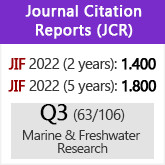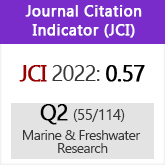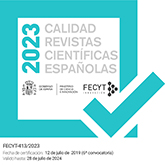The feeding behaviour of some demersal fish species in response to artificial discarding
DOI:
https://doi.org/10.3989/scimar.2002.66n3301Keywords:
Cantabrian Sea, diet, feeding behaviour, fisheries discards, scavengersAbstract
In an attempt to detect changes in the diet and the feeding intensity of demersal fish caused by fishery discarding, two hauls were carried out 22 h apart at a depth of 90 m in an area of the Cantabrian Sea closed to trawling. Before the second haul, dead fauna that were not common in the sampling area under natural conditions, such as Micromesistius poutassou and squat lobster (Munida spp.), which are both usually discarded by the fleet and mainly found in deeper water, were thrown overboard. A total of 319 stomach contents from 12 demersal fish species caught in both hauls were analysed. The percentage emptiness decreased in the second haul (32%) with respect to the first (43%), and at the same time the feeding intensity of scavenger species such as Trachinus draco, Pagellus acarne, Scyliorhinus canicula, Raja montagui and Leucoraja naevus increased. Discards of M. poutassou was actually found in the stomach of a typically planktophagous species, Pagellus bogaraveo. Observed changes in trophic structure of the species analysed as a response to discards are discussed.
Downloads
Download data is not yet available.
Downloads
Published
2002-09-30
How to Cite
1.
Olaso I, Sánchez F, Rodríguez-Cabello C, Velasco F. The feeding behaviour of some demersal fish species in response to artificial discarding. Sci. mar. [Internet]. 2002Sep.30 [cited 2024Apr.20];66(3):301-1. Available from: https://scientiamarina.revistas.csic.es/index.php/scientiamarina/article/view/589
Issue
Section
Articles
License
Copyright (c) 2002 Consejo Superior de Investigaciones Científicas (CSIC)

This work is licensed under a Creative Commons Attribution 4.0 International License.
© CSIC. Manuscripts published in both the printed and online versions of this Journal are the property of Consejo Superior de Investigaciones Científicas, and quoting this source is a requirement for any partial or full reproduction.All contents of this electronic edition, except where otherwise noted, are distributed under a “Creative Commons Attribution 4.0 International” (CC BY 4.0) License. You may read here the basic information and the legal text of the license. The indication of the CC BY 4.0 License must be expressly stated in this way when necessary.
Self-archiving in repositories, personal webpages or similar, of any version other than the published by the Editor, is not allowed.
















